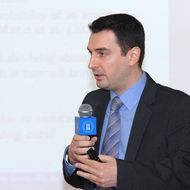- A
- A
- A
- АБB
- АБB
- АБB
- А
- А
- А
- А
- А
- Национальный исследовательский университет «Высшая школа экономики»
- Факультет экономических наук
- Департамент теоретической экономики
- Новости
- Публикация Эрена Арбатли в Journal of Economic Growth
-
Департамент
- О департаменте
- Сотрудники
- Лучшие преподаватели
- Аспиранты
- Учебные курсы
- Конкурс ППС
- Планирование учебной нагрузки
- Наука в департаменте
109028, Москва,
Покровский бульвар 11, Администрация департамента: офисы S1029, S1030; тел: +7(495) 772-95-90 *27172, 27174, 27601, 28270
PhD, Университет Штата Пенсильвания
Департамент теоретической экономики объединяет высококвалифицированных специалистов в различных областях экономической теории, включая микро и макроэкономику, теорию денег и финансов, экономическую историю и историю экономических учений. Наша миссия — обеспечение преподавания экономических дисциплин в НИУ ВШЭ на уровне ведущих западных университетов с учетом специфики профилей подготовки студентов.
 Как богатые страны стали богатыми, и почему бедные страны остаются бедными. 11-е изд.
Как богатые страны стали богатыми, и почему бедные страны остаются бедными. 11-е изд.
Райнерт Э. С.
М.: Издательский дом НИУ ВШЭ, 2025.
Вопросы теоретической экономики. 2025. № 1. С. 65-78.
Бондаренко К. А., Стародубцева М. Ф., Куприянов А. и др.
В кн.: Макроэкономика. Практикум странового анализа. М.: НИЦ Инфра-М, 2025. Гл. 2. С. 105-195.
Аналитические записки. 1. Банк России, 2024. № 10.
109028, Москва,
Покровский бульвар 11, Администрация департамента: офисы S1029, S1030; тел: +7(495) 772-95-90 *27172, 27174, 27601, 28270
PhD, Университет Штата Пенсильвания

Публикация Эрена Арбатли в Journal of Economic Growth

Аннотация: Can the economic legacy of highly skilled groups persist long after they were uprootedfrom their homelands? To answer this question, we study long-term sub-nationaldevelopment in Turkey after the mass expulsions of the Armenian and Greek com-munities of the Ottoman Empire in the early 20th century. Since these events led toan almost complete and permanent removal of both communities from Turkey withina short time period, they provide a unique quasi-natural experiment that rules out anydirect minority influence on development in the post-expulsion period. By exploitinglocal variations in historical minority population shares and community buildingsacross modern districts and villages/neighborhoods within each district, we documenta sizable Armenian and Greek legacy effect on contemporary measures of economicdevelopment. We argue that this persistent influence is grounded on the significantcontribution of Armenian and Greek communities to human capital accumulationamong Muslims. We show evidence that inter-group transfers of skills and knowledgewere instrumental in this process, leading to greater human capital among Muslims inminority regions both in the past and today.
Арбатли Джемаль Эрен
Департамент теоретической экономики: Доцент
- О ВЫШКЕ
- Цифры и факты
- Руководство и структура
- Устойчивое развитие в НИУ ВШЭ
- Преподаватели и сотрудники
- Корпуса и общежития
- Закупки
- Обращения граждан в НИУ ВШЭ
- Фонд целевого капитала
- Противодействие коррупции
- Сведения о доходах, расходах, об имуществе и обязательствах имущественного характера
- Сведения об образовательной организации
- Людям с ограниченными возможностями здоровья
- Единая платежная страница
- Работа в Вышке
- ОБРАЗОВАНИЕ
- Лицей
- Довузовская подготовка
- Олимпиады
- Прием в бакалавриат
- Вышка+
- Прием в магистратуру
- Аспирантура
- Дополнительное образование
- Центр развития карьеры
- Бизнес-инкубатор ВШЭ
- Образовательные партнерства
- Обратная связь и взаимодействие с получателями услуг
-
http://www.minobrnauki.gov.ru/
Министерство науки и высшего образования РФ
-
https://edu.gov.ru/
Министерство просвещения РФ
-
http://www.edu.ru
Федеральный портал «Российское образование»
-
https://elearning.hse.ru/mooc
Массовые открытые онлайн-курсы
- © НИУ ВШЭ 1993–2025 Адреса и контакты Условия использования материалов Политика конфиденциальности Карта сайта
- Редактору





